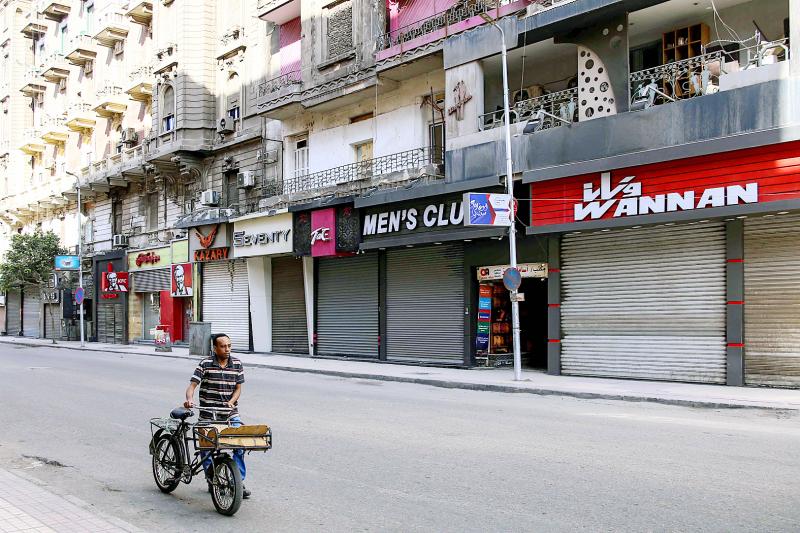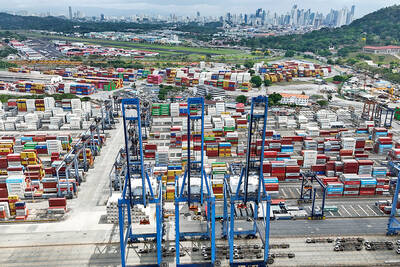It is a Thursday evening in downtown Cairo, usually a crowded and noisy time as the weekend gets underway, but today the streets are quiet, and the air is noticeably clean.
“It has been a long time since I breathed such fresh air here and saw the sky clean like that,” said downtown Cairo resident Fathi Ibrahim, 52.
Thick pollution — from vehicles, factories and power plants — usually makes breathing a suffocating effort in the heart of the city, he said, but a lockdown to slow the COVID-19 pandemic has helped clear the smog.

Photo: AFP
“We even started to listen to the sounds of birds early in the morning and the weather is also getting much better,” Ibrahim said.
Since mid-March, Egypt has imposed a night curfew and a partial lockdown as a part of precautionary measures to protect public health in a nation with more than 16,000 COVID-19 cases and more than 700 deaths.
The slowdown has cut air pollution by more than a third in Cairo, a city once ranked as one of the world’s 10 dirtiest.
Now Egyptian officials hope to hold onto those improvements by expanding clean transport networks — including using more electric buses — encouraging more cycling and potentially shifting business hours.
“We have already started plans to reduce air pollution in Egypt, but coronavirus is giving us an opportunity to accelerate these plans, expand them and think about other solutions,” Egyptian Minister of Environment Yasmine Fouad said in a telephone interview.
She said that the government is moving forward with plans to expand the Greater Cairo subway network to accommodate 6 million passengers a day by 2025, up from 3.5 million today.
It also plans to give grants to private car owners to help them convert their vehicles to run on natural gas, which creates less pollution, Fouad said.
“It is an opportunity to solve a decades-long problem that Cairo has been suffering from,” the minister said.
However, she said that cutting economic activity to cut pollution — as has happened during the lockdown — could not be the answer.
“We have to continue production at factories and other industrial institutions while applying high environmental standards. That is the right message we have to deliver,” she said.
According to ministry data, air quality has improved in Greater Cairo by 36 percent and in coastal cities and the Nile Delta by more than 40 percent since the lockdown and curfew went into effect.
Climate-changing carbon dioxide emissions and other pollutants from vehicles, factories and machinery have fallen, ministry data showed.
Fouad said that the government is expanding to more areas a bicycle-sharing project that started in Fayoum city, north of Cairo, in February.
The project, backed by the UN Development Programme, the Global Environment Facility and the Dutch government, so far gives students who commute to university access to a stand of a dozen shared bicycles at four locations in the city.
Over the next four years, the city would work toward providing a shared bicycle system accessible to every student in the country to encourage cycling and reduce traffic, Fouad said.
Cairo Traffic Department data indicates that more than 3 million cars, trucks and buses crowd the streets of Cairo each day.
Bassant Fahmi, an economist and a parliamentarian, said that turning to clean mass transit and encouraging more cycling would not only reduce traffic and air pollution, but also boost the economy, which loses billions of dollars each year to traffic congestion and air-pollution-related health problems.
The Egyptian Ministry of Health and Population said that about 2 million Egyptians end up in chest and respiratory clinics each year, often because of air-pollution-related ailments.
About 90 percent of Egyptians breathe dirty air, most of them in Greater Cairo and other cities, the ministry said.
Meanwhile, traffic congestion in Cairo costs the economy up to 50 billion Egyptian pounds (US$3.15 billion) each year — about 4 percent of Egypt’s GDP, according to a 2012 World Bank study.
“That is a lot of money that can be used instead in developmental projects or even ... on health and education,” Fahmi said.
Fahmi said that reviving legislation from the 1970s that required shops, workshops and commercial centers to close early to limit traffic and pollution could also help preserve air quality gains made during the pandemic lockdown.
“That would reduce a lot of energy used by those shops as well as reduce traffic in night hours, therefore lessening the harmful effect on the environment,” she said.

THE TRAGEDY OF PUNCH: Footage of the seven-month-old Japanese macaque has gone viral online after he was rejected by his mother and formed a bond with a soft toy A baby monkey in Japan has captured hearts around the world after videos of him being bullied by other monkeys and rejected by his mother went viral last week. Punch, a Japanese macaque, was born in July last year at Ichikawa City Zoo. He has drawn international attention after zookeepers gave him a stuffed orangutan toy after he was abandoned by his mother. Without maternal guidance to help him integrate, Punch has turned to the toy for comfort. He has been filmed multiple times being dragged and chased by older Japanese macaques inside the enclosure. Early clips showed him wandering alone with

South Korea would soon no longer be one of the few countries where Google Maps does not work properly, after its security-conscious government reversed a two-decade stance to approve the export of high-precision map data to overseas servers. The approval was made “on the condition that strict security requirements are met,” the South Korean Ministry of Land, Infrastructure and Transport said. Those conditions include blurring military and other sensitive security-related facilities, as well as restricting longitude and latitude coordinates for South Korean territory on products such as Google Maps and Google Earth, it said. The decision is expected to hurt Naver and Kakao

Australian Prime Minister Anthony Albanese yesterday said he did not take his security for granted, after he was evacuated from his residence for several hours following a bomb threat sent to a Chinese dance group. Albanese was evacuated from his Canberra residence late on Tuesday following the threat, and returned a few hours later after nothing suspicious was found. The bomb scare was among several e-mails threatening Albanese sent to a representative of Shen Yun, a classical Chinese dance troupe banned in China that is due to perform in Australia this month, a spokesperson for the group said in a statement. The e-mail

‘OCCUPATION’: Hong Kong said it had lodged ‘stern protests’ with Panama’s consulate, and would ‘staunchly support’ the rights and interests of Hong Kong companies Panamanian President Jose Raul Mulino on Monday ordered the temporary occupation of two ports run by a unit of CK Hutchison Holdings Ltd following the Supreme Court’s ruling against the firm’s concession, escalating a dispute that has become a proxy battle between the US and China in Latin America. Mulino said in a speech that the administration and operation of the two ports on the strategic Panama Canal is to revert to the country’s National Maritime Authority to ensure their uninterrupted, safe and efficient operation. The occupation covers movable equipment at the ports and does not mean a definitive loss of